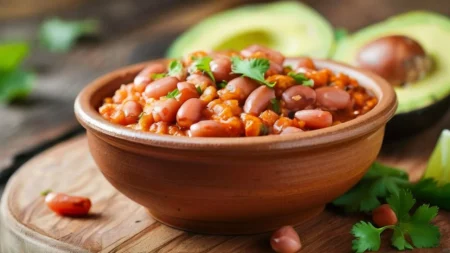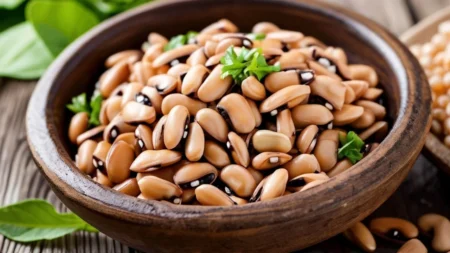In our society, where the pursuit of the perfect physique often leads to restrictive dieting and unsustainable weight loss practices, it’s time to explore a more balanced and long-term approach to weight management. This article provides a comprehensive guide to achieving your desired physique without the pitfalls of restrictive dieting. By emphasizing lifestyle changes and developing a healthy, balanced relationship with food, you can embark on a journey towards sustainable weight management that aligns with your overall well-being.
Instead of focusing on short-term weight loss solutions, this guide will empower you to make lifestyle changes that can be maintained in the long term. You’ll learn to incorporate enjoyable physical activity into your daily routine and cultivate a mindful relationship with food, all while avoiding the detrimental effects of restrictive dieting. By the end of this article, you’ll have a deeper understanding of how to manage your weight without the pitfalls of restrictive dieting, setting you on a path towards a healthier, more fulfilling lifestyle.
Key Takeaways
- Explore a sustainable approach to weight management that goes beyond restrictive dieting.
- Develop a healthy, balanced relationship with food through mindful eating practices.
- Incorporate enjoyable physical activity into your daily routine for long-term weight management.
- Shift your mindset away from short-term weight loss goals to a more holistic, sustainable lifestyle approach.
- Discover strategies to avoid the negative consequences of the yo-yo effect and weight regain.
Understanding the Dieting Cycle
Restrictive dieting has long been a go-to approach for weight management, but the growing body of research has shed light on its profound limitations. Embarking on a restrictive dieting regimen often leads individuals down a cyclical path of weight loss and subsequent weight regain, a phenomenon commonly referred to as the yo-yo effect.
The Pitfalls of Restrictive Dieting
Restrictive dieting can have a detrimental impact on both mental and physical health. Severe caloric restriction can lead to nutrient deficiencies, decreased metabolic rate, and a disruption in the body’s natural hunger and satiety signals. This often results in feelings of deprivation, irritability, and a heightened obsession with food, ultimately undermining long-term success and sustainable weight management.
The Yo-Yo Effect and Its Consequences
The yo-yo effect is a frustrating and all-too-common experience for those who have tried restrictive dieting. This cycle of weight loss and subsequent weight regain can have negative consequences, both physically and psychologically. Repeated weight fluctuations can lead to muscle loss, decreased bone density, and an increased risk of chronic health conditions, such as cardiovascular disease and type 2 diabetes.
By understanding the limitations of restrictive dieting and the detrimental effects of the yo-yo effect, individuals can begin to shift their mindset towards a more sustainable approach to weight management.
Developing a Mindful Relationship with Food
Cultivating a mindful relationship with food is essential for sustainable weight management. By recognizing hunger and fullness cues, you can learn to eat when truly physically hungry and stop when you feel comfortably full, rather than relying on emotional or external triggers. This practice of intuitive eating encourages you to make food choices based on your body’s signals, rather than strict dietary rules or restrictions.
Recognizing Hunger and Fullness Cues
Paying attention to your body’s hunger and fullness signals is a crucial step in developing a healthy relationship with food. Take time to identify physical sensations, such as a rumbling stomach or a feeling of satiety, that indicate when your body needs nourishment and when it’s time to stop eating. Practicing mindful eating, where you focus on the taste, texture, and aroma of your food, can help you become more attuned to these internal cues.
Overcoming Emotional Eating
Many people turn to food as a coping mechanism for emotional distress, a behavior known as emotional eating. To break this cycle, it’s important to develop alternate strategies for managing your emotions, such as journaling, talking to a trusted friend, or engaging in a favorite hobby. By addressing the root causes of emotional eating, you can cultivate a more balanced and sustainable relationship with food.
Practicing Intuitive Eating
Intuitive eating encourages you to honor your hunger, respect your fullness, and make food choices that align with your physical, emotional, and nutritional needs. This approach rejects the rigid rules of restrictive dieting and instead promotes a flexible, self-compassionate relationship with food. By tuning into your body’s signals and honoring your cravings, you can foster a mindful and sustainable approach to weight management.
Incorporating Balanced Nutrition
Achieving sustainable weight management goes beyond short-term weight loss solutions. A crucial aspect of this approach is incorporating balanced nutrition into your lifestyle. By focusing on balanced nutrition, you can support your overall health and well-being while working towards your weight goals.
The Importance of Macronutrients
Understanding the role of macronutrients is essential for maintaining a balanced diet. Macronutrients, which include carbohydrates, proteins, and fats, provide your body with the necessary energy and building blocks for optimal function. By ensuring you consume the right balance of these macronutrients, you can fuel your body in a way that supports sustainable weight management.
Meal Planning for Sustainable Results
Effective meal planning is a crucial component of a sustainable weight management approach. By strategically planning your meals and snacks, you can ensure that you’re consuming a balanced nutrition profile that aligns with your health and weight goals. This not only helps you avoid the pitfalls of restrictive dieting, but also promotes long-term nutritional guidelines that can be easily incorporated into your daily routine.
| Macronutrient | Recommended Daily Intake | Benefits for Weight Management |
|---|---|---|
| Carbohydrates | 45-65% of total calories | Provide energy, support brain function, and can be used as a fuel source for physical activity. |
| Proteins | 10-35% of total calories | Help maintain muscle mass, promote feelings of fullness, and support various bodily functions. |
| Fats | 20-35% of total calories | Facilitate nutrient absorption, provide energy, and contribute to overall hormonal balance. |
By incorporating balanced nutrition principles into your lifestyle, you can achieve sustainable weight management without the need for restrictive dieting. Remember, the key is to find a nutritional guidelines that works for you and your unique needs, allowing you to maintain a healthy, balanced nutrition over the long term.
Adopting a Non-Diet Mindset
As you embark on your weight management journey, it’s essential to shift your mindset away from restrictive dieting and embrace a more holistic, non-diet approach. This involves cultivating a deeper appreciation for your body, focusing on self-love, and prioritizing your overall well-being over strict weight-loss goals.
Embracing Body Acceptance
One of the key components of a non-diet mindset is embracing body acceptance. Rather than striving for an unattainable “ideal” body type, focus on celebrating the unique beauty and capabilities of your body as it is. Engage in practices that foster self-love, such as positive affirmations, avoiding comparisons to others, and recognizing your body’s inherent worth beyond its physical appearance.
By shifting your focus from weight-centric goals to a more holistic, non-diet mindset, you can cultivate a sustainable weight management approach that prioritizes your overall health and wellbeing. This self-love and body acceptance mindset can empower you to make lifestyle changes that are truly meaningful and lasting, ultimately leading to a more fulfilling and sustainable journey towards your desired physique.
The Role of Physical Activity
Embracing physical activity is a crucial component of sustainable weight management without dieting. Rather than relying solely on restrictive eating habits, incorporating enjoyable forms of movement into your lifestyle can significantly contribute to your overall health and well-being.
Finding Enjoyable Movement
The key to maintaining a physically active lifestyle is to find activities that you genuinely enjoy. Whether it’s a brisk walk through your neighborhood, a dance class that gets your heart pumping, or a strength training routine that challenges your muscles, the key is to choose forms of exercise that you find genuinely fulfilling. When you engage in physical activity that you find pleasurable, you’re more likely to stick with it in the long run, making it a sustainable part of your weight management journey.
Combining Cardio and Strength Training
To support your weight management goals without dieting, it’s important to incorporate a balanced approach to physical activity. This includes a combination of cardio exercises, such as running, swimming, or cycling, and strength training, which can include bodyweight exercises, resistance training, or weightlifting. By engaging in both aerobic and resistance-based activities, you can effectively burn calories, build muscle, and support your overall metabolic health, all while avoiding the pitfalls of restrictive dieting.
By making physical activity an integral part of your lifestyle, you can achieve sustainable weight management without the need for strict, unsustainable dieting. Remember, the key is to find forms of movement that you genuinely enjoy, and to maintain a balanced approach that supports your overall health and wellness.
FAQ
What is the key difference between a sustainable weight management approach and restrictive dieting?
The main difference is that a sustainable weight management approach focuses on developing healthy, balanced lifestyle habits that can be maintained in the long-term, rather than relying on short-term, restrictive dieting methods. This includes cultivating a mindful relationship with food, incorporating enjoyable physical activity, and adopting a non-diet mindset that prioritizes overall well-being over strict weight loss goals.
How can I recognize and overcome emotional eating?
Recognizing emotional eating involves becoming more aware of the triggers and emotions that drive your eating habits. When you feel the urge to eat, pause and ask yourself if you are truly physically hungry or if you are seeking food to cope with an emotion. Developing strategies like mindfulness, stress management, and alternative coping mechanisms can help you overcome emotional eating and maintain a balanced relationship with food.
What are the benefits of adopting a non-diet mindset for weight management?
Adopting a non-diet mindset can have numerous benefits for sustainable weight management. It allows you to shift your focus away from restrictive dieting and instead prioritize self-acceptance, intuitive eating, and overall well-being. This can lead to a more positive relationship with food, reduced stress and anxiety around eating, and a greater ability to maintain healthy habits in the long-term.
How can I incorporate enjoyable physical activity into my lifestyle?
The key is to find physical activities that you genuinely enjoy and can integrate into your daily routine. This could include anything from dance classes and hiking to swimming, cycling, or strength training. Experiment with different options until you discover the types of movement that you find most fulfilling and sustainable. Incorporating a balanced approach of cardio and strength training can also support your overall health and weight management goals.
What is the role of macronutrients in a balanced nutrition plan?
Macronutrients (carbohydrates, proteins, and fats) play a crucial role in a balanced nutrition plan for sustainable weight management. Each macronutrient serves important functions in the body and should be consumed in appropriate proportions to support your overall health and weight goals. Developing an understanding of macronutrient ratios and incorporating them into your meal planning can help you achieve a sustainable, nutrient-dense diet without the need for restrictive dieting.











